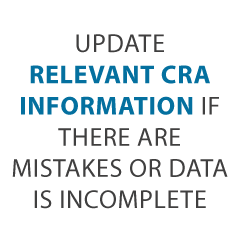- Connect With Us!
- (877) 600-2487
- info@creditsuite.com
Your Question: How Do I Run a Credit Check on a Business?
Published By Janet Gershen-Siegel at December 14th, 2017
Run a Credit Check on a Business Today
You Got This: exactly how to conveniently pull and assess business credit reports. We can show you how to run a credit check on a business.
Run a Credit Check on a Business: Stay On Top of Reports
Your best bet as a small business owner is to remain on top of business credit reports from PAYDEX, Equifax, and Experian. There are three big credit reporting agencies for small business and you really need to check all three of them regularly as they use moderately different yardsticks so moving the needle for one can move the needle for both of the others, although maybe not as much. Do not allow your small business credit scores slide, as you need to catch any mistakes as soon as you can, as well as detect anything which is pulling scores down then afterwards take remedial action. You can get reports conveniently and stay right on top of all three scores by following a few easy steps.
Run a Credit Check on a Business: PAYDEX
Dun & Bradstreet’s PAYDEX score of a company can end up being among the main reasons why a small business gets credit in any way. D & B furnishes Credit Signal, which is a way to track a credit score by having the reports come straight to you, for a price. You may find the fee is well worth it in order to avoid the headaches that can spring from letting this score slip. And you would not have to produce and stay on top of the organizing and reminders you might need to keep track of if you don’t make use of it.
Don’t wish to make use of Credit Signal? That’s fine, as you can get a PAYDEX report by way of D & B and, if needed, you can connect with their Customer Service department (this department exists as a section of Dun & Bradstreet itself). On top of that, in order to review a PAYDEX report, check out what D & B provides, which is a sample report and even some higher level recommendations in how you can analyze it.
Run a Credit Check on a Business: Your Small Business’s PAYDEX Score
A PAYDEX Score from Dun & Bradstreet runs from 0 to 100. This score has a basis in payment information which is on report to the agency. Or it is on report to data-gathering firms partnering with the CRA. https://creditreports.dnb.com/m/business-glossary/paydex-score.html
D & B uses this information, in addition to a credit score and Financial Stress Score, so as to advise how much credit a loan provider should extend to your company.
Getting a PAYDEX Score
To generate a PAYDEX score, you must file for a D-U-N-S number by way of Dun & Bradstreet’s site. The number is free of charge. In addition the credit reporting agency needs to have reports of your payments with four or more merchants.
Your small business’s PAYDEX score shows if your payments are generally made on time or ahead of schedule. As you may expect, a greater number is better.
PAYDEX Score Details
The scores work out as follows:
- 80-100: A low risk of late payments
- 50-79: A medium risk of late payments
- 49: A high risk of late payments
Business Credit Score
Your business’s credit rating runs from 1 to 5. 1 is the very best score. This matches your business with other small businesses with comparable payment histories. The figure reveals how frequently those businesses tend to pay in a timely manner.
This data can really help credit issuers to comprehend your company’s standing.
But it does not genuinely demonstrate all of the payment information from your small business.
Financial Stress Score
The financial stress score also runs from 1 to 5. This score matches your company with other companies sharing comparable financial and business traits.
These similarities are in areas like size or amount of time in business. This score demonstrates how frequently those small businesses tend to pay on time. As before, 1 is the best score. This rating is a more comprehensive evaluation of the business landscape, rather than analysis of your small business’s genuine payment history.
An awesome PAYDEX score for your small business is 80-100.
Run a Credit Check on a Business: Run a Credit Check on a Business: Equifax
Equifax, one of the large credit reporting firms, offers a risk monitoring service which is easier as it allows for reports to come straight to you. If you do not wish to purchase continual reports, you can instead order a business’s Equifax report. Also, if you have to question a company’s Equifax report, you can do so by adhering to the information on their web site. You can learn to evaluate an Equifax report by exploring a sample of their reports.
Run a Credit Check on a Business: Your Small Business’s Equifax Score
The Equifax Credit Risk Score comes from a model which they use to place specific risks. Equifax makes use of these details in its estimations, consisting of the depth of the credit details Experian can get the length of your small business’s credit history, as well as your business’s payment delinquency history. http://www.equifax.com/business/equifax-risk-score
http://www.equifax.com/assets/USCIS/efx-00178_efx_risk_score.pdf
http://www.equifax.com/assets/USCIS/efx-00164-9-13_efx_bni.pdf
Equifax then segments some 5 different scorecards together, by using statistical analysis. In order to improve their precision, Equifax suggests combining their Credit Risk Score with their proprietary Equifax Bankruptcy Navigator Index.
The Bankruptcy Navigator Index helps forecast the chance of your company going bankrupt in the next 24 months. Equifax bases its predictive model on over 270 million different accounts.
Equifax shows three different company determinations on its industrial credit reports. These are the Equifax Payment Index, your business’s Credit Risk Score, and its Business Failure Score.
Find out why so many companies are using our proven methods to improve their business credit scores.
Equifax Payment Index
Similar to the PAYDEX score, Equifax’s payment index, which has its gauge on a scale of 100, shows how many of your company’s payments were made promptly. These include both information from credit issuers and vendors.
But it’s not meant to forecast future behavior. That is what the other two scores are for.
Equifax Credit Risk Score
Equifax’s credit risk score checks how likely it is your business will become severely delinquent on payments. Scores run from 101 to 992, and they measure:
- Available credit limit on revolving credit accounts, e. g. credit cards
- Your company size
- Proof of any non-financial transactions (e. g. vendor invoices) which are overdue or were on charge off for two or more billing cycles
- Length of time since the opening of the oldest financial account
Find out why so many companies are using our proven methods to improve their business credit scores.
Equifax Business Failure Score
Finally, Equifax’s business failure score looks at the likelihood of your business shutting down. It ranges from 1,000 to 1,600, judging these factors:
- Total balance to total current credit limit average utilization in the past three months
- How long since the opening of the oldest financial account
- Your business’s worst payment status on all trades in the most recent 24 months.
- Documentation of any non-financial transactions (e. g. merchant invoices) which are late or have been on charge off for two or more billing cycles.
Equifax Scoring Analysis
For the credit risk and the business failure scores, a rating of 0 means bankruptcy.
An epic Equifax score for your company is as follows:
- Payment Index 0-10
- Credit Risk score 892-992
- Business Failure score 1400-1600
Run a Credit Check on a Business: Experian
Experian, another big credit reporting bureau, also offers a way for getting reports sent to you for a cost. Therefore you can track an Experian small business credit score and the setup is simple. On the other hand, if you would rather not get ongoing reports (and purchase them), then you can order a single Experian report for a company on their site. Also, if there are any complications or matters of contention, you can question any mistakes on a company’s Experian report if you follow the instructions on their web site. Learn about assessing a Experian report by reviewing an example Experian company credit report.
Often, it pays to hand over a few dollars so as to ensure that you acquire company credit reports on a regular basis. It’s a lot easier than have to remember to do this and you’ll probably look at these reports more carefully, as they come with a price tag. Stay on target and use the resources these credit reporting bureaus supply, and make your life easier. Because, you’ve already got enough on your plate.
Run a Credit Check on a Business: Your Small Business’s Experian Commercial Credit Score
Experian’s Credit Score report includes things like a company credit score along with additional data, including account histories, payment trends, and public records. Experian company credit scores range from 1 to 100.
Unlike Dun & Bradstreet’s PAYDEX score and Equifax’s payment index, Experian takes into account various factors, and not simply payment histories.
Experian’s scoring system is called Intelliscore Plus. http://www.experian.com/business-information/credit-risk-management.html
What is the Intelliscore Plus Credit Score?
The Intelliscore Plus credit score is a statistically based credit-risk analysis. The vital objective of Intelliscore Plus is to help companies, investors, and possible future loan providers make smart judgments concerning who they should or should not do business with.
Like an auto dealer uses a consumer’s FICO score to swiftly figure out just how much of a credit risk a prospective customer might be, the Intelliscore Plus credit score can provide insight on just how much of a credit risk a company or company owner may be.
Find out why so many companies are using our proven methods to improve their business credit scores.
Intelliscore Plus Credit Score Range
The Intelliscore ratings range from 1 to 100. So the greater your rating, the lower your risk class. The chart below details each Intelliscore Plus credit score range as well as its associated meaning.
Score Range/Risk Class
- 76 – 100 Low
- 51 – 752 Low – Medium
- 26 – 503 Medium
- 11 – 254 High – Medium
- 1 – 105 High
Computing an Intelliscore Plus Credit Score
In the credit world, Intelliscore Plus is regarded one of the most dependable tools in successfully forecasting risk. Among the ways Intelliscore Plus maintains this claim to fame is by identifying the major variables that show if a company is likely to pay their debts.
Though there more than 800 business and owner variables comprising an Intelliscore Plus credit score, the variables can be broken down into these essential elements:
Payment History
The agencies call this recency yet in the real world, it’s nothing more than your current payment status. This includes the amount of times your accounts end up being delinquent, the number of accounts that are currently overdue, and your overall trade balance.
Frequency
Similar to payment history, frequency represent the quantity of times your accounts have been sent out to collections, the quantity of liens and judgments you may have, and any bankruptcies connecting with your company or personal accounts.
Frequency can likewise consist of information relating to your payment patterns. Were you regularly slow or late with payment? Did you begin paying costs late, yet over time, stopped doing so? These elements will certainly all be taken into consideration.
Monetary
This certain facet focuses on exactly how you use credit. As an example, just how much of your readily available credit is currently being used? Do you have a high proportion of delinquent balance in comparison with your credit line?
If you will begin a company or are relatively new to this game, the listing above may appear a bit overwhelming. If you haven’t started or don’t have a lengthy history of company-based deals, just how will Intelliscore Plus rate you?
Intelliscore Plus manages these circumstances by using a “blended model” to establish your rating. This implies that they take your consumer credit score right into consideration when determining your business’s credit score.
Run a Credit Check on a Business: Takeaways
Keep your scores up and good things will happen. Run a credit check on a business whenever you need to. And improve your business credit scores to get even more funding options.

 " class="attachment-blog-single size-blog-single wp-post-image" alt="Get Business Credit Cards for New Businesses Credit Suite-Business Line of Credit Decoded" title="Get Business Credit Cards for New Businesses">>
" class="attachment-blog-single size-blog-single wp-post-image" alt="Get Business Credit Cards for New Businesses Credit Suite-Business Line of Credit Decoded" title="Get Business Credit Cards for New Businesses">>
